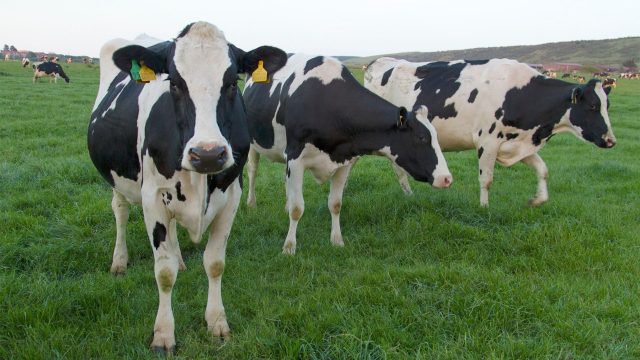07
Mar
USDA Allowing a Synthetic Hormone in Organic Milk Production, Despite a Mandate Against It

(Beyond Pesticides, March 7, 2022) Contrary to the demands of consumers for hormone-free organic dairy products and the requirements of the Organic Foods Production Act (OFPA), the U.S. Department of Agriculture (USDA) will allow continued use of the synthetic hormone oxytocin in organic dairy production. The National Organic Standards Board (NOSB) voted unanimously in 2017 to reject the use of the synthetic hormone oxytocin in livestock production. Since administration of oxytocin has been linked to a range of serious health problems and early onset puberty, autism, and psychiatric disorders, it is important to avoid residues in food that may cause a hormone imbalance in food consumers.
Substances on the National List are reconsidered every five years to determine whether they still meet criteria in OFPA—that is, that their use is (1) not harmful to human health or the environment, (2) necessary for organic production, and (3) consistent with organic practices. In the case of oxytocin, a hormone involved in the milk “let-down” reflex, there is longstanding concern that misuse of the hormone to increase milk production may be at the expense of the health of the cows. Increased milk production may also be at the expense of the organic dairy industry. USDA, with its mentality of increasing production, ignores the greater importance of organic principles to organic consumers.
In 2017, the NOSB unanimously recommended the sunsetting (removal) of oxytocin from the National List of Allowed and Prohibited Substances (National List). Oxytocin had been allowed to be used for “use in postparturition therapeutic applications” since 2000. In deciding not to relist oxytocin, the NOSB said, “[M]ethods and materials have been developed that make oxytocin less essential for maintaining animal health and welfare. The expectations and awareness of dairy production tools by consumers has changed over time. They now expect organic milk be produced without the use of synthetic hormones. The Livestock Subcommittee realizes that some producers may need to learn new methods to address post parturition issues, but we believe the knowledge and materials are present, so that there will be no interruption in commerce, economic hardship, or lessening of animal welfare if this material is removed from the National List of approved synthetics.”
Thus, the NOSB decided that oxytocin meets neither the essentiality nor the compatibility criterion. USDA ignored the NOSB decision and, contrary to OFPA, which prohibits USDA from adding any synthetic to the National List that has not been recommended by the NOSB, issued a final rule—which goes into effect March 30, 2022—relisting oxytocin.
Letter to USDA Secretary Vilsack:
USDA’s decision to relist oxytocin on the National List of synthetic materials allowed in organic production is contrary to the expectations of organic consumers and to the letter of the Organic Foods Production Act (OFPA).
Organic consumers expect that organic milk is produced without added hormones. Milk, because it is an important food for children, is especially critical for organic integrity.
Furthermore, taking an action to relist a synthetic material on the National List in spite of a recommendation to the contrary by the National Organic Standards Board is expressly prohibited by OFPA’s “no additions” clause (§6517(d)(2)).
I am extremely disturbed by actions taken by USDA that threaten organic integrity and the role of the NOSB in representing the organic community. The final rule is due to take effect on March 30. I request that you revoke the rule before that date.
Thank you.
Letter to U.S. Representative and Senators:
I am writing out of concern that USDA’s administration of the Organic Foods Production Act (OFPA) does not comply with either the law or the needs of the people it was designed to serve. In particular, USDA’s recent decision to relist oxytocin on the National List of synthetic materials allowed in organic production is contrary to the expectations of organic consumers and to the letter of OFPA.
Organic consumers expect that organic milk is produced without added hormones. Milk, because it is an important food for children, is especially critical for organic integrity. And yet, USDA, contrary to the recommendation of the National Organic Standards Board (NOSB), has relisted oxytocin, a synthetic hormone, for use in organic dairy.
Furthermore, taking an action to relist a synthetic material on the National List in spite of a recommendation to the contrary by the NOSB is expressly prohibited by OFPA’s “no additions” clause (§6517(d)(2)).
I am extremely disturbed by actions taken by USDA that threaten organic integrity and the role of the NOSB in representing the organic community. The final rule is due to take effect on March 30. Please ask USDA to revoke the rule before that date.
Thank you.











As an organic consumer I am firmly against any actions that weaken or allow a return to previous standards which do NOT promote the purest and best health interests of animals and humans alike! I oppose allowing synthetic hormones in milk production simply to boost production –that is NOT ORGANIC, and to me, smacks of Big Agra wanting to push out small truly organic/biodynamic farmers by untruthful and essentially fraudulent labeling! It’s time to strengthen, not weaken or dilute “Organic” standards, and let consumers decide what they will support–that’s what a ‘free market’ is supposed to be, isn’t it??
March 7th, 2022 at 11:37 amI am respectfully requesting you not allow Oxytocin to be allowed in Organic Milk. It is not something I want to be giving myself or my grandchildren. Please do not allow Organics to be changed in a way that is harmful to many of us that are sensitive, and pay the extra money for products unadulterated. Please reconsider this, as it is harmful for many of us! Thank you. Linda Olson
March 7th, 2022 at 6:12 pm